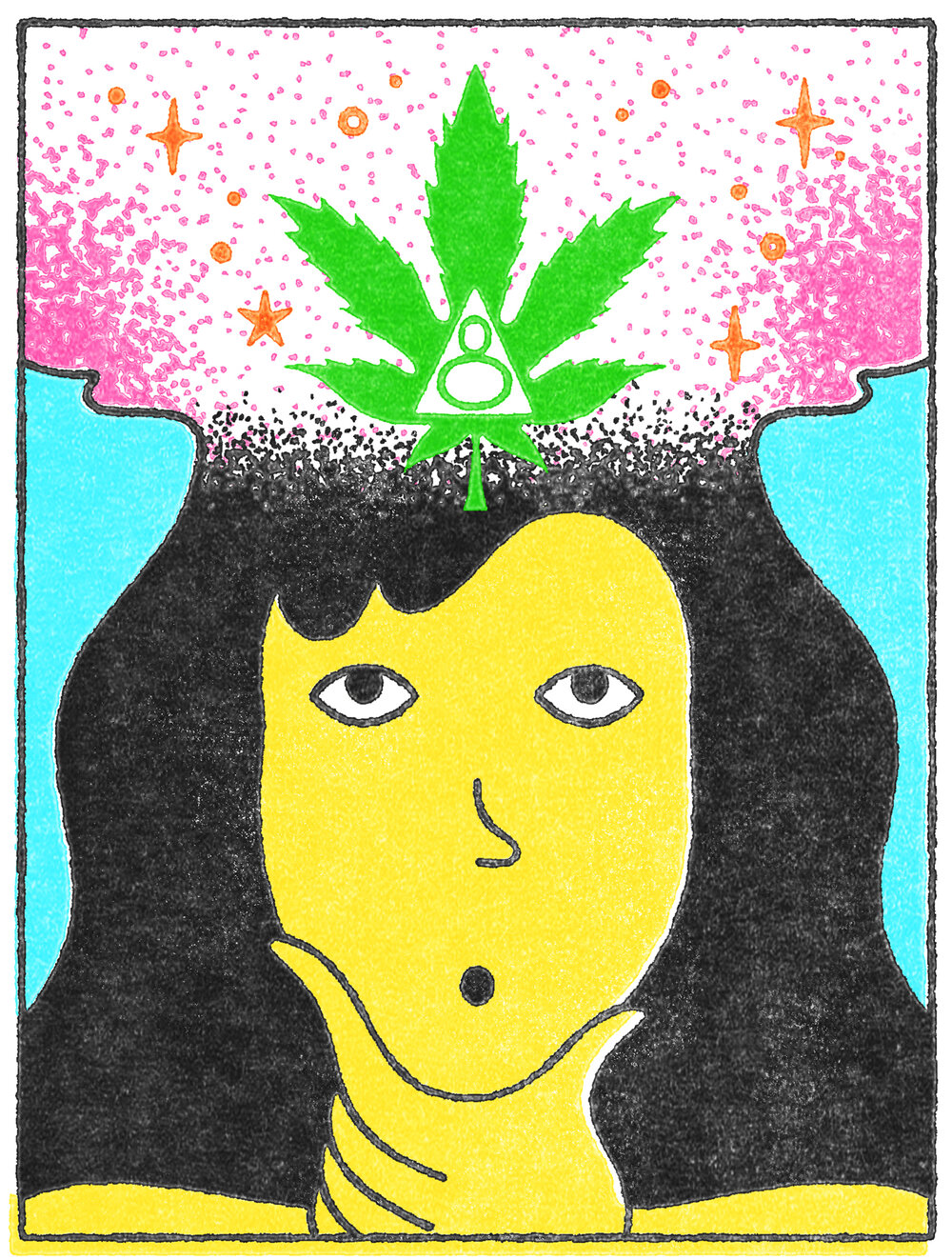Visit The Good Beer Hunting site
Weed is everywhere. Not only is it no longer edgy, it might even be borderline cheugy. But in states where cannabis is not yet legal—especially in the adult-use sense—we’re starting to see new, more creative products proliferate that skirt the boundaries of legality.
The most recent fighter to join the stable is Delta 8 (also known as Δ-8-THC and D8), a cannabinoid percolating to mainstream-awareness status. Available as flower, vape concentrate, edibles, and in other forms, it’s popped up most frequently on the East Coast and in other states without legal adult use.
 As Georgia Hemp Company co-owner Joe Salome explains via phone, “Scientifically, it’s one isomer different from Delta 9.” Delta-9-THC, he notes, is the psychoactive compound that’s federally illegal, and is the primary substance associated with “traditional weed.” Delta 8 is essentially a close cousin of THC—but there’s a key difference in how it’s produced. “[Delta 8 is] derived from hemp. It is a legal plant force,” Salome says.
As Georgia Hemp Company co-owner Joe Salome explains via phone, “Scientifically, it’s one isomer different from Delta 9.” Delta-9-THC, he notes, is the psychoactive compound that’s federally illegal, and is the primary substance associated with “traditional weed.” Delta 8 is essentially a close cousin of THC—but there’s a key difference in how it’s produced. “[Delta 8 is] derived from hemp. It is a legal plant force,” Salome says.
The spokesperson of CBD-testing collective Leafreport (and a naturopathic medicine provider), Dr. Zora DeGrandpre, offers more insight. “[Delta 8] occupies a legal ‘gray area’ [in the United States] currently as long as it is derived from hemp, and not from cannabis.” Essentially, what many customers buy as Delta-8-THC in flower form is a hunk of hemp flower doused in D8 concentrate. (This happens through a super speedy process of heating, cooling, then vaporizing the hemp called fractional distillation, which untangles the compound from the flower.)
“That gray area may not last very long, but, of course, time will tell,” DeGrandpre says. “Consumers should always be certain they are purchasing any hemp product from a reputable source, as opposed to producers who are more concerned with profit than purity, and should always check for independent [third-]party lab reports to ensure that the product they are buying does not contain contaminants such as heavy metals, pesticides, fungal and other toxins, and contaminating microbes.”
FLY HIGH If all of this sounds complex, that’s because it is. The cannabis scene has a chronic issue with over-intellectualizing the plant, to the point where canna-curious consumers are more likely to tap out than start a slow trudge through the seemingly endless list of acronyms and scientific jargon. (This hesitancy can be further amplified by a singular personal experience gone awry; I don’t know many folks who graduated from a liberal arts school without an edibles nightmare tale. On the other hand, the Delta-9-THC in weed is already so much stronger than it was some decades ago, so older folks looking to jump back into toking might be a bit wary—and with good reason!)
And yet for consumers who are looking for a chemical escape in non-legal states, the opportunity offered by Delta 8, and the growing curiosity about its potential, may override the complicating factors.
“I’ve been smoking the flower and eating gummies pretty often since then … maybe five days of the week. It usually gives me the same sort of high as [more traditional THC], but just a little less intense.”
— Hunter Pinkstone, musician“I had heard lots of friends talk about it, but always forgot about it until I actually saw it in the store,” says musician and regular pot-doer Hunter Pinkstone of Athens, Georgia. Georgia is a state with very restrictive cannabis laws, allowing only fringe-case consumption for medicinal reasons. Even then, what’s legal for that tiny portion of Georgians contains remarkably low levels of THC. “The person helping me at the store was super cool and really vouched for the Delta 8 stuff, so I figured I’d try it. I’ve been smoking the flower and eating gummies pretty often since then … maybe five days of the week. It usually gives me the same sort of high as [more traditional THC], but just a little less intense.” Pinkstone also says he likes that with Delta 8, the high feeling seemed more temporary.
Dan (who asked to be identified only by his first name), a technology professional in Atlanta, Georgia, agrees. “I’ve seen [Delta 8] described as ‘weed light,’ and I think that’s the most accurate description,” he says. “I’ve [had] both indicas and sativas of Delta 8 ... the indicas were honestly pretty tough to tell the difference from Delta 9. The sativas [yielded] definitely more a toned-down high that felt more like a strong buzz [rather] than a full intoxication.” (Note: Indica-dominant cannabis is characterized by a heavier body high, while sativa-dominant cannabis is more likely to yield cerebral effects, sometimes making its users feel paranoid. The best way to remember this is “indica” sounds like “in da couch,” which is where you’ll be if you ingest enough of it.)
Personally, I have very limited experiences with Delta 8. When visiting friends in Pittsburgh, I bought two gummies from a CBD shop, each containing 100mg of D8. I popped half of one and vomited, like, three times—but was it the gummy or was it the poached egg in the breakfast delivery I ordered? I tried a quarter the next time (about 25mg) and still experienced major stomach discomfort and … related issues. This is coming from someone who averages about a quarter- to half-ounce of Delta-9-THC flower a week. For context, the budtender at said shop said they popped a whole 100mg gummy for a great time. (One hundred milligrams of THC is considered about 10 times a normal “dose.”)
That said, I tore apart a D8 preroll procured from an Atlanta head shop that simmered just fine with my regular weed in the bong—it wasn’t profound enough to make a major impression on its own, but at least I didn’t ralph. Although it wasn’t a stomach-churning experience and yes, I did get high, I didn’t personally see the hype vs. my usual (illegal) porch-delivery service. Was I high from D8, or because of that dank-ass gas mixed in?
Another Atlantan, a public health professional who we can call M, reports similarly lackluster effects. They say they learned about Delta 8 from an email promotion and, after cashing in on the promotion for flower and gummies but feeling nothing, tried another approach. “A few weeks later, I thought I’d try a different delivery mechanism, and ordered some ‘high potency’ edibles—blame it on the TikTok gods—which took a million years to arrive and also had no effect whatsoever after several times, including on an empty stomach.” M says, on average, they smoke about a quarter-ounce of “traditional” weed a week.
With D8—like most cannabinoids, and weed in general—most evidence of its positives remains anecdotal. Until cannabis is federally legalized in the United States, we can’t go off much more than what other people tell us.
WHY BOTHER? Those in non-legal states may have more reason to dabble with Delta 8. When I reached out to folks residing in states with adult-use legalities in place, however, I ran into a whole lot of confusion and indifference.
First I asked Daniel, a stoner bartender in Los Angeles, if he had ever tried the cannabinoid. “Once,” he texted back. I asked for his read on the experience: “Eh.”
“I don’t know much about it,” Los Angeles-based comic and noted cannabis meme-maker Rachel Wolfson said. “It does weird me out a little.”
“It’s just cool to see other people find ways to use the plant, which brings me hope we’ll eventually be able to get funding to continue to study it so that we can [take advantage of] more of the medicinal benefits … to me it’s encouraging. Even though I don’t know much about Delta 8, it’s still optimistic.”
— Rachel Wolfson, comedianYet another Angeleno, who works professionally in the cannabis industry and didn’t want to be named, responded: “Wait, what’s Delta 8?” A poet friend in Seattle: “No, but I keep hearing about it.”
D8 might not be for the consumer with access to more full-spectrum, or “classic” weed. Still, that doesn’t mean it can’t play its part in the elevated, larger cannabis mission.
“It’s just cool to see other people find ways to use the plant, which brings me hope we’ll eventually be able to get funding to continue to study it so that we can [take advantage of] more of the medicinal benefits … to me it’s encouraging,” Wolfson told me. “Even though I don’t know much about Delta 8, it’s still optimistic.”
It’s true that exposing new consumers to potentially effective plant medicine could be net-positive. Think of how the introduction to and proliferation of the Impossible Burger exposed a new audience to how easy (and tasty) eating less meat can be; in theory, the new converts might be more open to exploring other vegetarian and vegan food options in future. Perhaps a law-wary canna-curious individual could begin with a solid experience with D8 and start to explore the wide world of dank from there.
DANGER DANGER New products are always exciting to the adventurous consumer, stoners included. So although D8 has been celebrating a surge in popularity while cha-cha-ing around the gray space of federal legality, that also means there aren’t exactly safety hurdles Delta-8-THC flower, carts, or edibles have to clear to make it onto shelves.
It’s worth being cautious: Potential risks run the gamut, starting from incorrect potency claims and going all the way up to possible hospitalization. A report Leafly obtained found dangerous heavy metals in a sample of Delta 8, including copper, lead, and nickel. Inhaling or swallowing copper can be poisonous, causing upper respiratory tract irritation. Ingesting lead is likely to wreak havoc on the kidneys and nervous system, sometimes leading to death.
As a result, some dispensaries in non-legal states, like Pure Ohio Wellness, halted sales of Delta 8 products completely as of June 16, despite their prior popularity. The Texas Legislature recently attempted to pass a House Bill that would ban the sale of Delta-8-THC (it flopped). New York is in the process of trying to pass a similar ban.
Salome says any D8 that Georgia Hemp Company puts up for sale has passed the various lab tests and evaluation processes the company has put in place for all its products, but he doesn’t offer specifics. The website’s FAQ page is similarly slippery, offering: “...it’s technically your responsibility to research the products you purchase and use.” He echoes this sentiment during our call. “So, how do customers know any product is safe that they’re buying? Whether it’s toothpaste, a steak, or whatever, I mean [customers determine safety] through their own research and brand reputation.”
He isn’t wrong, even if that logic feels evasive. Despite the death-threatening dangers of downing a pile of raw fish, sushi restaurants remain wildly popular. Consumers get to make the decision of whether the potential pay-off of ingesting anything is worth the potential risk(s).
 And when was the last time you asked your dro hookup for testing certifications? Although there’s a low likelihood someone would lace your illegally acquired pot with another substance, there remains a risk—one we enthusiastically dismiss every time we fire up in a state with harsh green laws. (Even in legal states, how many people do you know who read the pages of fine print that come standard with their sativa-spiked tea bags?)
And when was the last time you asked your dro hookup for testing certifications? Although there’s a low likelihood someone would lace your illegally acquired pot with another substance, there remains a risk—one we enthusiastically dismiss every time we fire up in a state with harsh green laws. (Even in legal states, how many people do you know who read the pages of fine print that come standard with their sativa-spiked tea bags?)
As DeGrandpre points out, side effects exist even with fully vetted cannabis. Generalized weed, she says, includes potential reactions like “increased appetite, dry mouth, diarrhea and, more seriously, increased short-term memory loss and a risk of exacerbating psychiatric disorders such as paranoia, anxiety, bipolar disorder, and depression.”
Yes, cannabis consumption (legal and not) can land you in the hospital for a bevy of reasons. Car accidents caused by driving under the influence—not unlike alcohol—are the most common. But what is more likely is a person whose pre-existing mental health conditions are further exacerbated by, quite frankly, getting too stoned.
“Consumers should check the track record of the company selling any form of hemp or cannabis product,” DeGrandpre suggests for all weed-ish products. “Starting at a low dose and slowly increasing that dose until a specific health goal has been achieved” is a smart approach when toe-dipping in the field. I’ve heard this called “the haircut method”: If you start slowly, you can always make further tweaks—but you can’t reverse course after going all-in.
COMING BACK FOR MORE Cannabis educator and industry consultant at Eminent Consulting, Emma Chasen, cites a recent study to explain why someone might choose Delta 8 over Delta 9, questions of legality aside. “When consuming Delta 8, patients have had much less psychotropic experiences compared to Delta 9,” Chasen says. “Despite having little intoxicating properties, Delta 8 exhibits therapeutic value especially as an antiemetic, analgesic, anxiolytic, and anti-inflammatory agent.” She adds that D8 could be a great alternative to D9 for a consumer worried about heavy psychotropic effects (thinking back to the trope-y anecdote of someone who slammed too many space brownies and ended up in the ER, convinced they were either dying or Jesus).
“When consuming Delta 8, patients have had much less psychotropic experiences compared to Delta 9. Despite having little intoxicating properties, Delta 8 exhibits therapeutic value especially as an antiemetic, analgesic, anxiolytic, and anti-inflammatory agent.”
— Emma Chasen, cannabis educatorSalome says D8 is likely to keep consumers coming back for more, as long as Delta-9-THC remains illegal and D8 remains in the gray area. “We’re in Georgia—you don’t have access [to legal] weed,” Salome says, adding that Delta 8 might save a stoner some coin. “You’re paying $40 to $50 for a[n illegal] vapor cartridge [of THC]. I’m selling [D8] for $25, again, knowing where [it] comes from … [plus, the product is] safe, tested, [and available in] multiple varieties.” Which is a good point: When buying any kind of weed-adjacent product in the illegal markets, your options are inherently limited, and you only “know” any product’s specifics based on whatever your source tells you.
However, it’s very likely most of the people giving Delta-8-THC a whirl are already very familiar with Delta-9-THC. If they want a more mellow high and live in a legal state with plenty of lower-THC strains available for purchase, they might not have a reason to try D8. And even if they do live in a state with restrictions, they likely already have a plug from whom they can shop.
Ultimately, until Delta-8-THC is reclassified and regulated more in line with Delta-9-THC, people are just gonna have to go off their own research and decide for themselves if they want to keep popping the cannabinoid.
M says that, after trying D8 and not finding the effects as enjoyable as D9, they’re unlikely to purchase again. Pinkstone says he’ll probably stick with normal weed, unless “the [illegal] dealers all dry up—as they do sometimes—or if I just wanted a more mellow [or] shorter high.”
Dan also doesn’t consider himself a new convert to D8 in most scenarios, but is likely to reup at some point, simply for the convenience of skipping small talk and the logistical details of copping in a non-legal state. “I won’t shy away from more traditional weed, but there is something to be said for walking into a store, purchasing a cart or flower, and going on with my day,” he says. (I need to introduce him to my dealer.) “I am still undecided if I’ll keep using it long-term or just stick with traditional [weed], but it is nice to have it as an option for now.”
Me? I’m probably also good to pass on that kind of grass, at least when it comes to intentionally scouting it out. I know I’ll never have a D8 edible again. But I’m still not above opting out of the rotation should someone roll up with a Delta-8-THC fattie.

 Words by Beca Grimm
Words by Beca Grimm
Illustrations by Lan Truong
More...
As Georgia Hemp Company co-owner Joe Salome explains via phone, “Scientifically, it’s one isomer different from Delta 9.” Delta-9-THC, he notes, is the psychoactive compound that’s federally illegal, and is the primary substance associated with “traditional weed.” Delta 8 is essentially a close cousin of THC—but there’s a key difference in how it’s produced. “[Delta 8 is] derived from hemp. It is a legal plant force,” Salome says.
And when was the last time you asked your dro hookup for testing certifications? Although there’s a low likelihood someone would lace your illegally acquired pot with another substance, there remains a risk—one we enthusiastically dismiss every time we fire up in a state with harsh green laws. (Even in legal states, how many people do you know who read the pages of fine print that come standard with their sativa-spiked tea bags?)
Words by Beca Grimm





 Reply With Quote
Reply With Quote